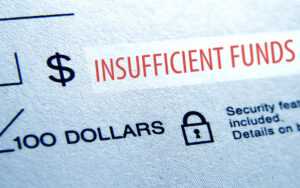What is NSF and How Does it Affect Your Checking Account?
Non-Sufficient Funds (NSF) is a term used in banking to describe a situation where there are not enough funds in a checking account to cover a transaction. When a transaction is initiated, such as writing a check or making a debit card purchase, the bank will attempt to withdraw the necessary funds from the account. If there are insufficient funds available, the transaction will be declined and the account will be considered to have a NSF status.
Having NSF status can have several negative consequences for your checking account. Firstly, the bank may charge you an NSF fee for each transaction that is declined due to insufficient funds. These fees can vary depending on the bank and the type of transaction, but they can add up quickly if you frequently have insufficient funds in your account.
In addition to the fees, having NSF status can also damage your relationship with the bank. Banks may view customers with a history of NSF transactions as unreliable or risky, which can make it more difficult to open new accounts or obtain credit in the future. It is important to maintain a positive banking history and avoid NSF transactions whenever possible.
To avoid NSF transactions and the associated fees, it is important to carefully monitor your checking account balance and keep track of your transactions. Make sure to record all checks, debit card purchases, and automatic bill payments to ensure that you have enough funds available. It can also be helpful to set up alerts or notifications from your bank to inform you when your account balance is low.
If you do find yourself in a situation where you have insufficient funds in your account, there are a few options to consider. You can try to transfer funds from another account to cover the transaction, or you can contact the recipient of the payment and explain the situation. Some banks also offer overdraft protection programs, which allow you to link a savings account or credit card to your checking account to cover any overdrafts. However, these programs may come with their own fees and requirements, so it is important to understand the terms and conditions before enrolling.
Tips to Avoid NSF Fees and Manage Your Checking Account
Non-sufficient funds (NSF) fees can be a frustrating and costly aspect of managing your checking account. These fees are charged when you try to make a payment or withdrawal that exceeds the available balance in your account. However, with some careful planning and smart financial habits, you can avoid NSF fees and effectively manage your checking account.
Create a Budget

One of the most effective ways to avoid NSF fees is to create a budget and stick to it. A budget helps you track your income and expenses, ensuring that you always have enough funds to cover your bills and other financial obligations. By setting spending limits and tracking your expenses, you can avoid overspending and prevent your account from going into a negative balance.
Monitor Your Account Regularly
Set Up Alerts
Most banks offer account alerts that can notify you via email or text message about low balances, upcoming bills, and other account activities. Setting up these alerts can help you stay on top of your finances and avoid NSF fees. By receiving timely notifications, you can take immediate action to transfer funds or adjust your spending to prevent overdrawing your account.
Link Your Accounts
If you have multiple accounts with the same bank, consider linking them together. By linking your accounts, you can set up automatic transfers to cover any shortfalls in your checking account. For example, if you have a savings account with sufficient funds, the bank can automatically transfer money from your savings to your checking account to avoid NSF fees. This can provide an extra layer of protection and prevent accidental overdrafts.
Keep a Buffer

It’s always a good idea to keep a buffer in your checking account to cover any unexpected expenses or fluctuations in your income. By maintaining a cushion of funds, you can avoid dipping into the negative balance and triggering NSF fees. Aim to keep at least a few hundred dollars as a buffer, but adjust the amount based on your individual financial situation.
By following these tips, you can avoid NSF fees and effectively manage your checking account. Remember to create a budget, monitor your account regularly, set up alerts, link your accounts, and keep a buffer. With these strategies in place, you can maintain control of your finances and avoid unnecessary fees.

Emily Bibb simplifies finance through bestselling books and articles, bridging complex concepts for everyday understanding. Engaging audiences via social media, she shares insights for financial success. Active in seminars and philanthropy, Bibb aims to create a more financially informed society, driven by her passion for empowering others.
